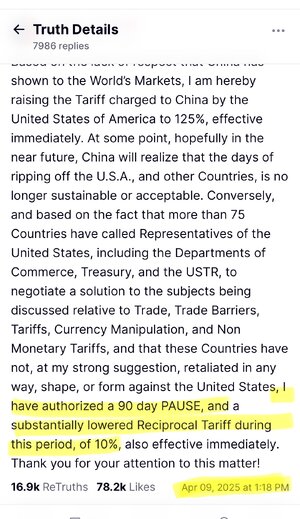Navigation
Install the app
How to install the app on iOS
Follow along with the video below to see how to install our site as a web app on your home screen.
Note: This feature may not be available in some browsers.
More options
You are using an out of date browser. It may not display this or other websites correctly.
You should upgrade or use an alternative browser.
You should upgrade or use an alternative browser.
Tariffs Catch-All
- Thread starter BubbaOtis
- Start date
- Replies: 5K
- Views: 178K
- Politics
circlesky88
Esteemed Member
- Messages
- 619
evrheel
Esteemed Member
- Messages
- 587
Changing from an income tax to a national sales tax
- Messages
- 41,585
Trump to Soften Blow of Automotive Tariffs
Companies paying Trump’s car tariffs won’t also be charged for other levies
“President Trump is expected to soften the impact of his automotive tariffs, preventing duties on foreign-made cars from stacking on top of other tariffs he has imposed and easing some levies on foreign parts used to manufacture cars in the U.S., according to people familiar with the matter.
The decision will mean that automakers paying Trump’s automotive tariffs won’t also be charged for other duties, such as those on steel and aluminum, according to people familiar with the policy. The move would be retroactive, the people said, meaning that automakers could be reimbursed for such tariffs already paid. The 25% tariff on finished foreign-made cars went into effect early this month.
The administration will also modify its tariffs on foreign auto parts—slated to be 25% and effective May 3—allowing automakers to be reimbursed for those tariffs up to an amount equal to 3.75% of the value of a U.S.-made car for one year. The reimbursement would fall to 2.75% of the car’s value in a second year, and then be phased out altogether.
Trump is expected to take the actions ahead of a trip to Michigan for a rally outside Detroit on Tuesday evening, marking 100 days since he took office. …”
——

- Messages
- 41,585
“… The steps are meant to provide automakers time to move supply chains for parts back to the U.S., and would likely be a significant boost to automakers in the short term, said one person familiar with the plan.Trump to Soften Blow of Automotive Tariffs
Companies paying Trump’s car tariffs won’t also be charged for other levies
“President Trump is expected to soften the impact of his automotive tariffs, preventing duties on foreign-made cars from stacking on top of other tariffs he has imposed and easing some levies on foreign parts used to manufacture cars in the U.S., according to people familiar with the matter.
The decision will mean that automakers paying Trump’s automotive tariffs won’t also be charged for other duties, such as those on steel and aluminum, according to people familiar with the policy. The move would be retroactive, the people said, meaning that automakers could be reimbursed for such tariffs already paid. The 25% tariff on finished foreign-made cars went into effect early this month.
The administration will also modify its tariffs on foreign auto parts—slated to be 25% and effective May 3—allowing automakers to be reimbursed for those tariffs up to an amount equal to 3.75% of the value of a U.S.-made car for one year. The reimbursement would fall to 2.75% of the car’s value in a second year, and then be phased out altogether.
Trump is expected to take the actions ahead of a trip to Michigan for a rally outside Detroit on Tuesday evening, marking 100 days since he took office. …”
——

Automakers would have to apply to the government for reimbursements, and it wasn’t immediately clear where those funds would come from.“
Mulberry Heel
Inconceivable Member
- Messages
- 4,000
Oh, I'm sure that will make everything better! So Trump 2.0 has already reached the stage of "trying to put financial band aids over the gaping wounds our own administration has cut into our economy." Their whole (at least public) rationale for DOGE cuts was to save the government money and help fix the budget deficit, but now they're going to spend vastly more than they've "saved" (which in itself is a dubious claim) to bail out everyone from the damage their own trade wars have caused. It's insanity, pure insanity, and yet there are still plenty of people arguing that everything is perfectly fine and normal and Dear Leader is still a smashing success.Trump to Soften Blow of Automotive Tariffs
Companies paying Trump’s car tariffs won’t also be charged for other levies
“President Trump is expected to soften the impact of his automotive tariffs, preventing duties on foreign-made cars from stacking on top of other tariffs he has imposed and easing some levies on foreign parts used to manufacture cars in the U.S., according to people familiar with the matter.
The decision will mean that automakers paying Trump’s automotive tariffs won’t also be charged for other duties, such as those on steel and aluminum, according to people familiar with the policy. The move would be retroactive, the people said, meaning that automakers could be reimbursed for such tariffs already paid. The 25% tariff on finished foreign-made cars went into effect early this month.
The administration will also modify its tariffs on foreign auto parts—slated to be 25% and effective May 3—allowing automakers to be reimbursed for those tariffs up to an amount equal to 3.75% of the value of a U.S.-made car for one year. The reimbursement would fall to 2.75% of the car’s value in a second year, and then be phased out altogether.
Trump is expected to take the actions ahead of a trip to Michigan for a rally outside Detroit on Tuesday evening, marking 100 days since he took office. …”
——

evrheel
Esteemed Member
- Messages
- 587
Easier said, than done“… The steps are meant to provide automakers time to move supply chains for parts back to the U.S., and would likely be a significant boost to automakers in the short term, said one person familiar with the plan.
Automakers would have to apply to the government for reimbursements, and it wasn’t immediately clear where those funds would come from.“
ChapelHillSooner
Iconic Member
- Messages
- 1,370
So I did a little investigation into the number of SPY call contracts that were 0 day to expiration and 3-5% out of money on 4/8/25 and 4/9/25 with 15 minute intervals.
CALL CONTRACTS (OOM 3%-5%) at 2025-04-08 09:30:00: 14943
CALL CONTRACTS (OOM 3%-5%) at 2025-04-08 09:45:00: 13931
CALL CONTRACTS (OOM 3%-5%) at 2025-04-08 10:00:00: 15885
CALL CONTRACTS (OOM 3%-5%) at 2025-04-08 10:15:00: 9212
CALL CONTRACTS (OOM 3%-5%) at 2025-04-08 10:30:00: 6919
CALL CONTRACTS (OOM 3%-5%) at 2025-04-08 10:45:00: 17603
CALL CONTRACTS (OOM 3%-5%) at 2025-04-08 11:00:00: 7516
CALL CONTRACTS (OOM 3%-5%) at 2025-04-08 11:15:00: 4133
CALL CONTRACTS (OOM 3%-5%) at 2025-04-08 11:30:00: 1668
CALL CONTRACTS (OOM 3%-5%) at 2025-04-08 11:45:00: 1944
CALL CONTRACTS (OOM 3%-5%) at 2025-04-08 12:00:00: 681
CALL CONTRACTS (OOM 3%-5%) at 2025-04-08 12:15:00: 2404
CALL CONTRACTS (OOM 3%-5%) at 2025-04-08 12:30:00: 1283
CALL CONTRACTS (OOM 3%-5%) at 2025-04-08 12:45:00: 1223
CALL CONTRACTS (OOM 3%-5%) at 2025-04-08 13:00:00: 1477
CALL CONTRACTS (OOM 3%-5%) at 2025-04-08 13:15:00: 834
CALL CONTRACTS (OOM 3%-5%) at 2025-04-08 13:30:00: 745
CALL CONTRACTS (OOM 3%-5%) at 2025-04-08 13:45:00: 702
CALL CONTRACTS (OOM 3%-5%) at 2025-04-08 14:00:00: 795
CALL CONTRACTS (OOM 3%-5%) at 2025-04-08 14:15:00: 96
CALL CONTRACTS (OOM 3%-5%) at 2025-04-08 14:30:00: 161
CALL CONTRACTS (OOM 3%-5%) at 2025-04-08 14:45:00: 114
CALL CONTRACTS (OOM 3%-5%) at 2025-04-08 15:00:00: 47
CALL CONTRACTS (OOM 3%-5%) at 2025-04-08 15:15:00: 515
CALL CONTRACTS (OOM 3%-5%) at 2025-04-08 15:30:00: 535
CALL CONTRACTS (OOM 3%-5%) at 2025-04-08 15:45:00: 193
CALL CONTRACTS (OOM 3%-5%) at 2025-04-08 16:00:00: 68
CALL CONTRACTS (OOM 3%-5%) at 2025-04-09 09:30:00: 30069
CALL CONTRACTS (OOM 3%-5%) at 2025-04-09 09:45:00: 32191
CALL CONTRACTS (OOM 3%-5%) at 2025-04-09 10:00:00: 39518
CALL CONTRACTS (OOM 3%-5%) at 2025-04-09 10:15:00: 20807
CALL CONTRACTS (OOM 3%-5%) at 2025-04-09 10:30:00: 24962
CALL CONTRACTS (OOM 3%-5%) at 2025-04-09 10:45:00: 26113
CALL CONTRACTS (OOM 3%-5%) at 2025-04-09 11:00:00: 17208
CALL CONTRACTS (OOM 3%-5%) at 2025-04-09 11:15:00: 19535
CALL CONTRACTS (OOM 3%-5%) at 2025-04-09 11:30:00: 16069
CALL CONTRACTS (OOM 3%-5%) at 2025-04-09 11:45:00: 16586
CALL CONTRACTS (OOM 3%-5%) at 2025-04-09 12:00:00: 35942
CALL CONTRACTS (OOM 3%-5%) at 2025-04-09 12:15:00: 18114
CALL CONTRACTS (OOM 3%-5%) at 2025-04-09 12:30:00: 10787
CALL CONTRACTS (OOM 3%-5%) at 2025-04-09 12:45:00: 24442
CALL CONTRACTS (OOM 3%-5%) at 2025-04-09 13:00:00: 71422
CALL CONTRACTS (OOM 3%-5%) at 2025-04-09 13:15:00: 48368
CALL CONTRACTS (OOM 3%-5%) at 2025-04-09 13:30:00: 5879
CALL CONTRACTS (OOM 3%-5%) at 2025-04-09 13:45:00: 4430
CALL CONTRACTS (OOM 3%-5%) at 2025-04-09 14:00:00: 4415
CALL CONTRACTS (OOM 3%-5%) at 2025-04-09 14:15:00: 1970
CALL CONTRACTS (OOM 3%-5%) at 2025-04-09 14:30:00: 779
CALL CONTRACTS (OOM 3%-5%) at 2025-04-09 14:45:00: 652
CALL CONTRACTS (OOM 3%-5%) at 2025-04-09 15:00:00: 2081
CALL CONTRACTS (OOM 3%-5%) at 2025-04-09 15:15:00: 1517
CALL CONTRACTS (OOM 3%-5%) at 2025-04-09 15:30:00: 1185
CALL CONTRACTS (OOM 3%-5%) at 2025-04-09 15:45:00: 3037
CALL CONTRACTS (OOM 3%-5%) at 2025-04-09 16:00:00: 732
The number of far OOM calls made on 4/9 were significantly higher than on 4/8. That would be expected because Trump posted it was a good time to buy early in the day on 4/9. However, the spike from 12:45-13:15 is significant. I can't get a timestamp on Trump's post to delay tariffs but it appears the S&P didn't take off until about 13:18-13:19 which means the aforementioned spike happened before the post was made.
So, it definitely seems to me that someone reacted right before the post was made.
CALL CONTRACTS (OOM 3%-5%) at 2025-04-08 09:30:00: 14943
CALL CONTRACTS (OOM 3%-5%) at 2025-04-08 09:45:00: 13931
CALL CONTRACTS (OOM 3%-5%) at 2025-04-08 10:00:00: 15885
CALL CONTRACTS (OOM 3%-5%) at 2025-04-08 10:15:00: 9212
CALL CONTRACTS (OOM 3%-5%) at 2025-04-08 10:30:00: 6919
CALL CONTRACTS (OOM 3%-5%) at 2025-04-08 10:45:00: 17603
CALL CONTRACTS (OOM 3%-5%) at 2025-04-08 11:00:00: 7516
CALL CONTRACTS (OOM 3%-5%) at 2025-04-08 11:15:00: 4133
CALL CONTRACTS (OOM 3%-5%) at 2025-04-08 11:30:00: 1668
CALL CONTRACTS (OOM 3%-5%) at 2025-04-08 11:45:00: 1944
CALL CONTRACTS (OOM 3%-5%) at 2025-04-08 12:00:00: 681
CALL CONTRACTS (OOM 3%-5%) at 2025-04-08 12:15:00: 2404
CALL CONTRACTS (OOM 3%-5%) at 2025-04-08 12:30:00: 1283
CALL CONTRACTS (OOM 3%-5%) at 2025-04-08 12:45:00: 1223
CALL CONTRACTS (OOM 3%-5%) at 2025-04-08 13:00:00: 1477
CALL CONTRACTS (OOM 3%-5%) at 2025-04-08 13:15:00: 834
CALL CONTRACTS (OOM 3%-5%) at 2025-04-08 13:30:00: 745
CALL CONTRACTS (OOM 3%-5%) at 2025-04-08 13:45:00: 702
CALL CONTRACTS (OOM 3%-5%) at 2025-04-08 14:00:00: 795
CALL CONTRACTS (OOM 3%-5%) at 2025-04-08 14:15:00: 96
CALL CONTRACTS (OOM 3%-5%) at 2025-04-08 14:30:00: 161
CALL CONTRACTS (OOM 3%-5%) at 2025-04-08 14:45:00: 114
CALL CONTRACTS (OOM 3%-5%) at 2025-04-08 15:00:00: 47
CALL CONTRACTS (OOM 3%-5%) at 2025-04-08 15:15:00: 515
CALL CONTRACTS (OOM 3%-5%) at 2025-04-08 15:30:00: 535
CALL CONTRACTS (OOM 3%-5%) at 2025-04-08 15:45:00: 193
CALL CONTRACTS (OOM 3%-5%) at 2025-04-08 16:00:00: 68
CALL CONTRACTS (OOM 3%-5%) at 2025-04-09 09:30:00: 30069
CALL CONTRACTS (OOM 3%-5%) at 2025-04-09 09:45:00: 32191
CALL CONTRACTS (OOM 3%-5%) at 2025-04-09 10:00:00: 39518
CALL CONTRACTS (OOM 3%-5%) at 2025-04-09 10:15:00: 20807
CALL CONTRACTS (OOM 3%-5%) at 2025-04-09 10:30:00: 24962
CALL CONTRACTS (OOM 3%-5%) at 2025-04-09 10:45:00: 26113
CALL CONTRACTS (OOM 3%-5%) at 2025-04-09 11:00:00: 17208
CALL CONTRACTS (OOM 3%-5%) at 2025-04-09 11:15:00: 19535
CALL CONTRACTS (OOM 3%-5%) at 2025-04-09 11:30:00: 16069
CALL CONTRACTS (OOM 3%-5%) at 2025-04-09 11:45:00: 16586
CALL CONTRACTS (OOM 3%-5%) at 2025-04-09 12:00:00: 35942
CALL CONTRACTS (OOM 3%-5%) at 2025-04-09 12:15:00: 18114
CALL CONTRACTS (OOM 3%-5%) at 2025-04-09 12:30:00: 10787
CALL CONTRACTS (OOM 3%-5%) at 2025-04-09 12:45:00: 24442
CALL CONTRACTS (OOM 3%-5%) at 2025-04-09 13:00:00: 71422
CALL CONTRACTS (OOM 3%-5%) at 2025-04-09 13:15:00: 48368
CALL CONTRACTS (OOM 3%-5%) at 2025-04-09 13:30:00: 5879
CALL CONTRACTS (OOM 3%-5%) at 2025-04-09 13:45:00: 4430
CALL CONTRACTS (OOM 3%-5%) at 2025-04-09 14:00:00: 4415
CALL CONTRACTS (OOM 3%-5%) at 2025-04-09 14:15:00: 1970
CALL CONTRACTS (OOM 3%-5%) at 2025-04-09 14:30:00: 779
CALL CONTRACTS (OOM 3%-5%) at 2025-04-09 14:45:00: 652
CALL CONTRACTS (OOM 3%-5%) at 2025-04-09 15:00:00: 2081
CALL CONTRACTS (OOM 3%-5%) at 2025-04-09 15:15:00: 1517
CALL CONTRACTS (OOM 3%-5%) at 2025-04-09 15:30:00: 1185
CALL CONTRACTS (OOM 3%-5%) at 2025-04-09 15:45:00: 3037
CALL CONTRACTS (OOM 3%-5%) at 2025-04-09 16:00:00: 732
The number of far OOM calls made on 4/9 were significantly higher than on 4/8. That would be expected because Trump posted it was a good time to buy early in the day on 4/9. However, the spike from 12:45-13:15 is significant. I can't get a timestamp on Trump's post to delay tariffs but it appears the S&P didn't take off until about 13:18-13:19 which means the aforementioned spike happened before the post was made.
So, it definitely seems to me that someone reacted right before the post was made.
- Messages
- 41,585
So I did a little investigation into the number of SPY call contracts that were 0 day to expiration and 3-5% out of money on 4/8/25 and 4/9/25 with 15 minute intervals.
CALL CONTRACTS (OOM 3%-5%) at 2025-04-08 09:30:00: 14943
CALL CONTRACTS (OOM 3%-5%) at 2025-04-08 09:45:00: 13931
CALL CONTRACTS (OOM 3%-5%) at 2025-04-08 10:00:00: 15885
CALL CONTRACTS (OOM 3%-5%) at 2025-04-08 10:15:00: 9212
CALL CONTRACTS (OOM 3%-5%) at 2025-04-08 10:30:00: 6919
CALL CONTRACTS (OOM 3%-5%) at 2025-04-08 10:45:00: 17603
CALL CONTRACTS (OOM 3%-5%) at 2025-04-08 11:00:00: 7516
CALL CONTRACTS (OOM 3%-5%) at 2025-04-08 11:15:00: 4133
CALL CONTRACTS (OOM 3%-5%) at 2025-04-08 11:30:00: 1668
CALL CONTRACTS (OOM 3%-5%) at 2025-04-08 11:45:00: 1944
CALL CONTRACTS (OOM 3%-5%) at 2025-04-08 12:00:00: 681
CALL CONTRACTS (OOM 3%-5%) at 2025-04-08 12:15:00: 2404
CALL CONTRACTS (OOM 3%-5%) at 2025-04-08 12:30:00: 1283
CALL CONTRACTS (OOM 3%-5%) at 2025-04-08 12:45:00: 1223
CALL CONTRACTS (OOM 3%-5%) at 2025-04-08 13:00:00: 1477
CALL CONTRACTS (OOM 3%-5%) at 2025-04-08 13:15:00: 834
CALL CONTRACTS (OOM 3%-5%) at 2025-04-08 13:30:00: 745
CALL CONTRACTS (OOM 3%-5%) at 2025-04-08 13:45:00: 702
CALL CONTRACTS (OOM 3%-5%) at 2025-04-08 14:00:00: 795
CALL CONTRACTS (OOM 3%-5%) at 2025-04-08 14:15:00: 96
CALL CONTRACTS (OOM 3%-5%) at 2025-04-08 14:30:00: 161
CALL CONTRACTS (OOM 3%-5%) at 2025-04-08 14:45:00: 114
CALL CONTRACTS (OOM 3%-5%) at 2025-04-08 15:00:00: 47
CALL CONTRACTS (OOM 3%-5%) at 2025-04-08 15:15:00: 515
CALL CONTRACTS (OOM 3%-5%) at 2025-04-08 15:30:00: 535
CALL CONTRACTS (OOM 3%-5%) at 2025-04-08 15:45:00: 193
CALL CONTRACTS (OOM 3%-5%) at 2025-04-08 16:00:00: 68
CALL CONTRACTS (OOM 3%-5%) at 2025-04-09 09:30:00: 30069
CALL CONTRACTS (OOM 3%-5%) at 2025-04-09 09:45:00: 32191
CALL CONTRACTS (OOM 3%-5%) at 2025-04-09 10:00:00: 39518
CALL CONTRACTS (OOM 3%-5%) at 2025-04-09 10:15:00: 20807
CALL CONTRACTS (OOM 3%-5%) at 2025-04-09 10:30:00: 24962
CALL CONTRACTS (OOM 3%-5%) at 2025-04-09 10:45:00: 26113
CALL CONTRACTS (OOM 3%-5%) at 2025-04-09 11:00:00: 17208
CALL CONTRACTS (OOM 3%-5%) at 2025-04-09 11:15:00: 19535
CALL CONTRACTS (OOM 3%-5%) at 2025-04-09 11:30:00: 16069
CALL CONTRACTS (OOM 3%-5%) at 2025-04-09 11:45:00: 16586
CALL CONTRACTS (OOM 3%-5%) at 2025-04-09 12:00:00: 35942
CALL CONTRACTS (OOM 3%-5%) at 2025-04-09 12:15:00: 18114
CALL CONTRACTS (OOM 3%-5%) at 2025-04-09 12:30:00: 10787
CALL CONTRACTS (OOM 3%-5%) at 2025-04-09 12:45:00: 24442
CALL CONTRACTS (OOM 3%-5%) at 2025-04-09 13:00:00: 71422
CALL CONTRACTS (OOM 3%-5%) at 2025-04-09 13:15:00: 48368
CALL CONTRACTS (OOM 3%-5%) at 2025-04-09 13:30:00: 5879
CALL CONTRACTS (OOM 3%-5%) at 2025-04-09 13:45:00: 4430
CALL CONTRACTS (OOM 3%-5%) at 2025-04-09 14:00:00: 4415
CALL CONTRACTS (OOM 3%-5%) at 2025-04-09 14:15:00: 1970
CALL CONTRACTS (OOM 3%-5%) at 2025-04-09 14:30:00: 779
CALL CONTRACTS (OOM 3%-5%) at 2025-04-09 14:45:00: 652
CALL CONTRACTS (OOM 3%-5%) at 2025-04-09 15:00:00: 2081
CALL CONTRACTS (OOM 3%-5%) at 2025-04-09 15:15:00: 1517
CALL CONTRACTS (OOM 3%-5%) at 2025-04-09 15:30:00: 1185
CALL CONTRACTS (OOM 3%-5%) at 2025-04-09 15:45:00: 3037
CALL CONTRACTS (OOM 3%-5%) at 2025-04-09 16:00:00: 732
The number of far OOM calls made on 4/9 were significantly higher than on 4/8. That would be expected because Trump posted it was a good time to buy early in the day on 4/9. However, the spike from 12:45-13:15 is significant. I can't get a timestamp on Trump's post to delay tariffs but it appears the S&P didn't take off until about 13:18-13:19 which means the aforementioned spike happened before the post was made.
So, it definitely seems to me that someone reacted right before the post was made.

ChapelHillSooner
Iconic Member
- Messages
- 1,370
I take back my previous post. I wasn't yet able to figure out how to get the SPY price at the time the option was bought to figure out whether the option was 3-5% OOM so I used the price at the start of the day. I was able to figure out how to get the more granular prices, and while the price didn't move significantly before 1 PM that day, it moved enough to skew the results.
superrific
Master of the ZZLverse
- Messages
- 12,447
Like my dad always used to say, never bring a knife to an escalation letter fight
superrific
Master of the ZZLverse
- Messages
- 12,447
What Bessent said there might well be the wussiest quote ever from any American cabinet member. "Very anxious not to have to use it?"
- Messages
- 5,217
Apollo Global Management forecasts a severe U.S. recession triggered by recent tariffs, which will lead to widespread layoffs in the trucking and retail sectors amid rising economic uncertainty.
The report, available on Apollo’s website, paints a grim scenario:
The trucking industry, critical to U.S. logistics, faces significant challenges as tariffs disrupt trade, particularly with China. A sharp decline in container ship voyages from China is expected to reduce freight volumes, thereby lowering demand for trucking services. Imports account for an estimated 20% of U.S. trucking volumes, so a decline in imports will have a significant impact on the industry. With fewer goods to transport, carriers will face reduced workloads and underutilized fleets, forcing them to cut labor costs.
Apollo predicts that domestic freight activity will sharply slow by mid-May, with mass layoffs likely to follow as firms strive to maintain financial stability. The slowdown in trucking will put a lot of pressure on trucking companies that have been dealing with the Great Freight Recession, one of the longest and deepest downturns in history.
- Messages
- 5,217
Well it's not like a tariff caused farm crisis is imminent or anything.

 coloradosun.com
coloradosun.com

Colorado farmers just lost their most important mental health lifeline
Farmers and ranchers, with a suicide rate twice as high as the average population, will no longer have access to AgWell mental health program.
 coloradosun.com
coloradosun.com
- Messages
- 5,217
related: JD Vance Funded AcreTrader. Here’s Why That Matters.Well it's not like a tariff caused farm crisis is imminent or anything.

Colorado farmers just lost their most important mental health lifeline
Farmers and ranchers, with a suicide rate twice as high as the average population, will no longer have access to AgWell mental health program.coloradosun.com
ZenMode
Legend of ZZL
- Messages
- 6,374
I suspect the pain from Trump's tariff games is en route.
Trans-Pacific blank sailings soar as ocean shipments plunge
Tariffs hammer China export container volumes

 www.freightwaves.com
www.freightwaves.com
Trans-Pacific blank sailings soar as ocean shipments plunge
Tariffs hammer China export container volumes

Trans-Pacific blank sailings soar as ocean shipments plunge
Container shipping capacity on the Asia-U.S. trade route has sharply declined as carriers ramp up blank sailings.
 www.freightwaves.com
www.freightwaves.com
Last edited:
bassydude77
Distinguished Member
- Messages
- 282
Just posted this on the markets thread, but probably fits better here.
It certainly "feels" like we are already in a recession. We've had the slowest start to the year in the 11yrs we've been in business. May tends to be when things pick up, so we'll see what happens. I'm trying to not be too pessimistic as I know my feelings toward the current administration are largely driving my feelings around the economy. I assume there are plenty of MAGA still dancing around thinking it is the best economy in history and somehow "feel" that their groceries are now costing less....
It certainly "feels" like we are already in a recession. We've had the slowest start to the year in the 11yrs we've been in business. May tends to be when things pick up, so we'll see what happens. I'm trying to not be too pessimistic as I know my feelings toward the current administration are largely driving my feelings around the economy. I assume there are plenty of MAGA still dancing around thinking it is the best economy in history and somehow "feel" that their groceries are now costing less....
- Messages
- 41,585
GM Pulls Profit Guidance, Citing ‘Significant’ Tariff Impact
Detroit automaker’s net income slid 6.6% in the first quarter on weaker sales of highly profitable trucks and SUVs
“…
“Given the evolving nature of the situation, we believe the future impact of tariffs could be significant,” Jacobson told reporters on a call Monday evening.
GM reported quarterly earnings Tuesday morning but said it would delay its analysts call until Thursday, an unusual move that underscores the rapidly shifting trade environment.
Trump is expected to soften the impact of auto tariffs, actions that will be taken ahead of a trip to Michigan for a rally Tuesday evening, The Wall Street Journal reported late Monday. …”
——
The base incompetence of the Trump tariff decisions cannot be overstated.
- Messages
- 41,585
Also a lot of weird blips in GM’s TTM data … recovery from the UAW strike last year and a pre-tariff bump in auto purchases in the first quarter this year makes for some unusual events buffeting what would usually be hailed as a strong report …GM Pulls Profit Guidance, Citing ‘Significant’ Tariff Impact
Detroit automaker’s net income slid 6.6% in the first quarter on weaker sales of highly profitable trucks and SUVs

—> https://www.wsj.com/business/autos/...80?st=prEvjt&reflink=mobilewebshare_permalink
“…
“Given the evolving nature of the situation, we believe the future impact of tariffs could be significant,” Jacobson told reporters on a call Monday evening.
GM reported quarterly earnings Tuesday morning but said it would delay its analysts call until Thursday, an unusual move that underscores the rapidly shifting trade environment.
Trump is expected to soften the impact of auto tariffs, actions that will be taken ahead of a trip to Michigan for a rally Tuesday evening, The Wall Street Journal reported late Monday. …”
——
The base incompetence of the Trump tariff decisions cannot be overstated.
Share:



